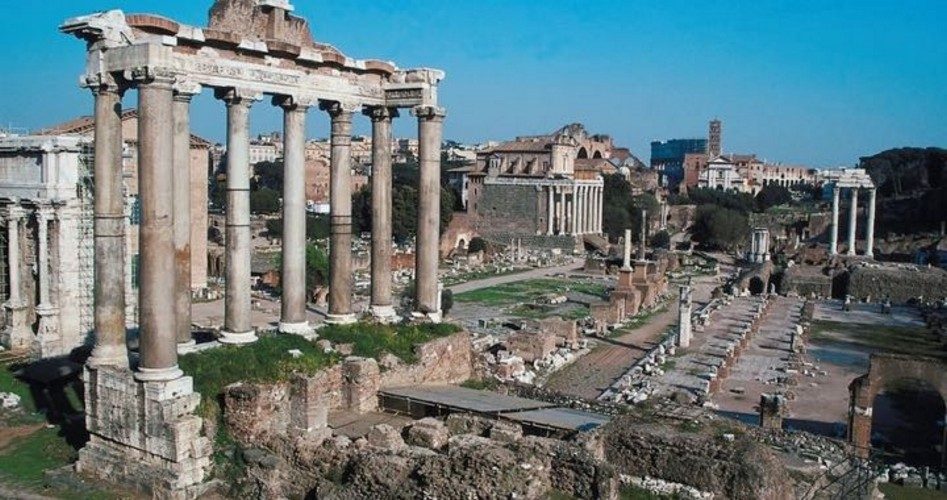
Eminent historian Tom Holland (no, not the actor who plays Spiderman) quotes a tweet written by Bill Kristol bemoaning the blinding speed at which the United States is careering down the road that led ancient Rome to ruin.
“The speed with which we’re recapitulating the decline and fall of Rome is impressive. What took Rome centuries we’re achieving in months,” Kristol tweeted, as reported by Holland in The Spectator.
But Holland somewhat dismisses the claim. “For a millennium and a half now, one of the great pleasures of being a commentator on current affairs has been comparing a political crisis to the fall of the Roman Empire. Nothing recently has quite so turbo-charged this perennial trend like the presidency of Donald Trump,” Holland writes. And he should know: Tom Holland is the author of several engaging books chronicling the rise, rule, and ruin of the Caesars, including Dynasty: The Rise and Fall of the House of Caesar and Rubicon: The Last Years of the Roman Republic.
Holland reminds readers worried that President Trump is a neo-Caligula or other such psychotic autocrat that similar comparisons have been made for decades, if not centuries by American media keen on demonstrating their erudition. “Back in 1919, in the wake of the Russian Revolution, it was the New York Times that was fretting about Huns and Vandals. ‘The Roman Empire and its civilization,’ it sternly warned then, ‘were destroyed by barbarian hordes,’” Holland writes.
Holland went on: “Nothing, perhaps, has been quite so enduringly American as the conviction that the country is on the verge of decline and fall.”
While Holland — again, an authority of ancient Rome nonpareil — muses that the comparisons may be “divorced from historical reality,” there is much to be learned from history, particularly the history of a once republican people (the Romans) whose exploits and excesses were known to the Founding Generation of America from their youngest days. And one thing to be learned is about how Roman society actually fell.
I’ve written thousands of words myself on this seemingly inexhaustible subject, but one particularly noteworthy recorder of Rome’s life and end was Algernon Sidney — a man who was admired by our Founding Fathers and whose own steadfast commitment to republican government cost him his life.
Briefly, Algernon Sidney (1623–1683) was the son of Robert Sidney, the 2nd Earl of Leicester. All extant evidence points toward Sidney’s early devotion to republican principles. So pure and deeply rooted was Sidney’s adherence to the principles of mixed government that he opposed the execution of English monarch Charles I for treason, and he distanced himself from former allies after becoming disillusioned with Oliver Cromwell, the 1st lord protector of the Commonwealth of England, for abandoning republican principles, including heavy-handedly side-stepping Parliament.
Sidney left England and was living in France when the English monarchy was restored in 1660. He spent the years of self-imposed exile trying to negotiate with the governments of Holland and France to back a republican invasion of England. Unsuccessful in his diplomatic efforts, Sidney returned to England in 1677 and immediately joined his fellow republicans in opposition to Charles II, who had ordered the dismissal of Parliament. Soon, Sidney was implicated on the flimsiest of evidence in the Rye House Plot, a scheme to assassinate Charles II and his brother, and was forthwith arrested. His arrest was chiefly a means to silence one known to be antithetical to despotism.
As the trial began, the king’s solicitors decried Sidney as a “false, seditious, and libelous traitor” whose writings fomented revolution by inciting the people to “rise up in arms against the King.”
While Sidney denied the charges of fomenting an uprising, he did not deny that he was an enemy of absolute monarchy. His study of history made it apparent that the best of all government was a mixed government wherein the royal prerogatives are limited and restrained, and are counterbalanced against the inviolable and natural right of a free people to be self-governing. A book of his beliefs, Discourses Concerning Government, was used against him by the prosecution.
Discourses Concerning Government was a response to Patriarcha, an apology of the divine right of absolute monarchy written by Robert Filmer. Filmer argued that the monarch was the father of the people and that as such he had a divine and unassailable right to rule as he saw fit. The people, as the children of the monarch, thrived best when they were obedient to the monarch’s sovereign rule, according to the philosophy of Filmer.
Sidney refuted Filmer, pointing out that monarchs are more apt to be despots than father figures. His work was a classic in political theory and a standard work in the canon of republicanism.
In fact, his work was lauded by some of the Founders. In their guidelines for students applying to study at the University of Virginia published n 1825, James Madison and Thomas Jefferson wrote that Sidney’s Discourses Concerning Government “may be considered as those generally approved by our fellow citizens of this, and of the US. and that on the distinctive principles of the gov[ern]m[en]t of our own state, and of that of the US. as understood and assented to when brought into union.” Higher praise from a more esteemed source seems nearly impossible.
Back to Rome and Sidney and the story of the decline and fall of the former as interpreted by the latter.
Sidney entitled Section 12 of Chapter Two of Discourses Concerning Government “The Glory, Virtue, and Power of the Romans began and ended with their Liberty.”
While the entire volume is recommended to all readers of The New American and all Americans with a sincere desire to understand better the minds of the Founding Fathers, this particular portion of Discourses Concerning Government speaks to the subject of Tom Holland’s article — is the current era reminiscent of a decadent and declining era in the history of Rome — and to the more general theme of the lessons to be learned by Americans from the history of Rome of the descent of her people and her princeps.
Sidney argues that the Roman republic lasted as long as it did because the people had good character:
It were ridiculous to impute this [the republic’s longevity] to chance, or to think that fortune, which of all things is the most variable, could for so many ages continue the same course, unless supported by virtue; or to suppose that all these monarchies which are so much extoll’d, could have been destroyed by that commonwealth, if it had wanted strength, stability, virtue, or good order. The secret counsels of God are impenetrable; but the ways by which he accomplishes his designs are often evident: When he intends to exalt a people, he fills both them and their leaders with the virtues suitable to the accomplishment of his end; and takes away all wisdom and virtue from those he resolves to destroy.
Sidney continues, commenting on the relatively rapid descent of Romans from the height of virtue and vigor to the nadir of constant welfare and warfare:
That people which in magnanimity surpassed all that have been known in the world; who never found any enterprize [sic] above their spirit to undertake, and power to accomplish, with their liberty lost all their vigour [sic] and virtue. They who by their votes had disposed of kingdoms and provinces, fell to desire nothing but to live and see plays.
The last word on finding correlaries between ancient Rome and contemporary America, particularly in the last several years, will be given to Algernon Sidney, with all due respect to Tom Holland.
Sidney blames the demise of the Romans not on some sacking by Goths or Gauls, but on the Romans’ own abandonment of their “mos maiorum,” their traditional values and virtue.
They who by their valour had arrived at such a height of glory, power, greatness, and happiness as was never equalled, and who in all appearance had nothing to fear from any foreign power, could never have fallen, unless their virtue and discipline had decay’d, and the corruption of their manners had excited them to turn their victorious swords into their own bowels.
With all merited deference to Dr. Holland, Algernon Sidney’s sad story sounds, to this writer, all too familiar and all too close to home.
Photo: Clipart.com



